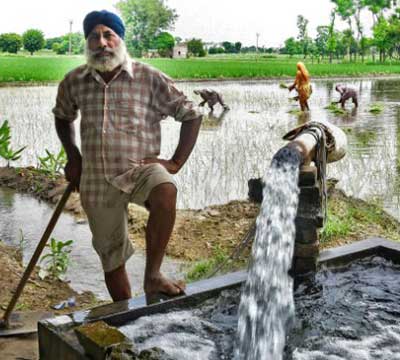Relevance: GS-3: Conservation, Environmental Pollution and Degradation, Environmental Impact Assessment.
Key Phrases: CGWA, CGWB, PM Kusum, Mihir Shah Committee, National Water Commission, Water Quality Division;
Why in News?
- Central Ground Water Authority (CGWA) has recently announced that Rs 10,000 will be charged as a registration fee for the extraction of groundwater for drinking and domestic use.
- But would this charge be sufficient to halt the groundwater exploitation?
Key Highlights
More about CGWA’s Order
- All the existing users are given a one-time opportunity to register their groundwater withdrawal by June 30.
- The completed application must be submitted before September 30.
- Strict action will be constituted against illegal extraction of groundwater i.e. those who are extracting without permission from CGWA
Groundwater : Administrative Angle
- Water is a subject on the State list.
- Yet, the Union Government has circulated a Model Bill to the States and Union Territories to enable them to enact suitable legislation for regulation and control of groundwater development.
- So far 11 States/UTs have enacted Legislation on the lines of the Model Bill circulated by the MOWR (current, Jal Shakti Ministry).
- As per the assessment carried out by CGWB (Central Ground Water Board), the following standards have been adhered to.

- Stage of groundwater development is the ratio between annual
groundwater draft and net annual groundwater availability.
- If it is above 100% then, we are extracting the groundwater more than what is being available in a year.
- CGWB analysis of about 5723 groundwater assessment units, resulted
in the classification of these units as
- Over-exploited - 839,
- Critical - 226,
- Semi-critical – 550
- NAQUIM (National Aquifer Mapping and Management program) was launched by CGWB.
- CGWA was formed under Environment Protection Act 1986.
Status of Groundwater Extraction
- India is the largest groundwater extractor
- In 2020, it extracted 64% of the total groundwater potential.
- Most of the groundwater extraction is concentrated in a few states.
- States like UP, Punjab, MP, Maharashtra, Tamil Nadu and Gujarat together accounted for about 59% of the total draft of groundwater.
- Most of the groundwater extracted is used for agriculture purposes.
- 90% of groundwater extraction is for this purpose.
- This is why the export of water-intensive crops like Rice is also called hidden water export.
- Area under irrigation from extracted groundwater has increased 7 times. (48 MHA in 2018-19 from 7.3 MHA in 1960-61).
- 90% of groundwater extraction is for this purpose.
The Main Culprit of Groundwater Extraction: Faulty Electricity Pricing
- Heavily subsidised electricity or Free electricity encourages users to exploit more groundwater as the marginal cost for extraction becomes zero for the user.
- Electricity has been heavily subsidised in the state of Punjab,
Haryana and Tamil Nadu
- The average stage of groundwater development is 127% (2020).
- This is defined as
- Number of safe blocks is also low.
- The average stage of groundwater development is 127% (2020).
Impact Due to the Exploitation of Groundwater
- Reduction in groundwater level.
- As per a NASA report (2009), Groundwater has been declining by 1 meter every 3 years in states like Rajasthan, Punjab and Haryana.
- Deterioration of quality of groundwater.
- Number of blocks qualified as safe has increased from 28% (2004) to 36% (2020).
- Number of blocks designated as saline has increased to 100 from 30. (2004-2020)
- Number of Overexploited areas has increased.
- These are concentrated in Punjab, Haryana, Rajasthan and Tamil Nadu.
- World Bank has cautioned that 60% of aquifers will reach the level of overexploitation by 2032.
- Disproportionate effect on Small and marginal farmers
- As per Agri Census (2015), 86.5% of farmers are Small and Marginal. They have shallow tube wells which are more vulnerable to drying up due to overexploitation of groundwater resources.
- 5th Minor Irrigation Census (2017), a total of 4.14 lakh open wells in India became defunct between 2006-07 and 2013-14.
- Extraction from deep aquifers increases the chances of getting contaminated by elements like Arsenic and Uranium.
Way Forward
- Bring in discriminated fee instead of the current single charge of Rs
10K
- Utilize the ability-to-pay principle to charge proportionate fees on big farmers and the users who are more prone to extract more groundwater.
- This could be based on the type of motor used in tube wells/ quantity of water extracted.
- Small farmers using less than 5 HP pumps mustn’t be charged under this.
- This would have an effect on the choice of crops as well, with farmers selecting crops as per their agroclimatic zones.
- Schemes like PM Kusum should be implemented across states.
- Solar-powered pumps save the exchequer from the huge subsidy burden on subsidised electricity.
- It would also check the indiscriminate extraction of groundwater.
- Demand Side Measures
- Traditional Water Storing Techniques to meet the needs
- Ahar-Pynes in Bihar, Mission Kakatiya in Telangana, Taanka in Rajasthan.
- Jal Shakti Mission to enhance water storing capacity.
- Atal Bhujal Yojana to rejuvenate aquifers.
- Traditional Water Storing Techniques to meet the needs
- Implement recommendations of Mihir Shah regarding groundwater
- Revamping CGWB and CWC (Central Water Commission) into the National Water Commission (NWC) for a unified approach to sustainable water management.
- National Aquifer Management Programme (NAMP) for mapping and management of aquifer systems in the country.
- Water Security Division to tackle water security.
- Water Quality Division to map the quality of aquifers.
Conclusion
- Groundwater as a resource is limited. In order to preserve this resource for the future, it would be prudent to judiciously utilise every drop of it.
Source: The Hindu BL
Mains Question:
Q. Is India facing a groundwater crisis? Substantiate your answer. Also, mention its impact on various sectors along with a suitable way forward.







